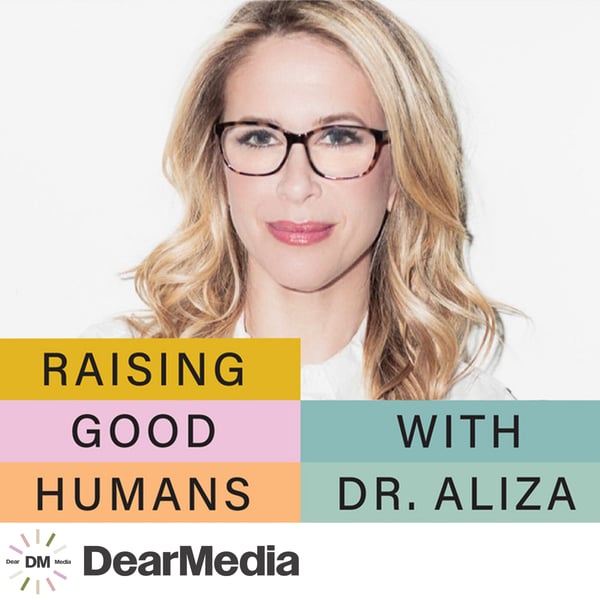The Science of Happiness with Professor Laurie Santos
Raising Good Humans
Dear Media, Aliza Pressman
4.6 • 1.8K Ratings
🗓️ 16 May 2025
⏱️ 55 minutes
🧾️ Download transcript
Summary
In today’s episode Yale professor and The Happiness Lab host Dr. Laurie Santos breaks down the science of happiness, sharing what research actually shows boosts our wellbeing—and what doesn’t. We explore the difference between feeling good in your life and feeling good about your life, and how strategies like social connection, movement, sleep, time affluence, and self-compassion can make a measurable impact. We also dive into helpful insights for parents, explaining how well-intentioned efforts to help can sometimes backfire, and what we can do instead to foster happiness in our children.
I WROTE MY FIRST BOOK! Order your copy of The Five Principles of Parenting: Your Essential Guide to Raising Good Humans Here: https://bit.ly/3rMLMsL
Subscribe to my free newsletter for parenting tips delivered straight to your inbox: draliza.substack.com
Follow me on Instagram for more:
@raisinggoodhumanspodcast
Sponsors:
Ground News: Go to https://groundnews.com/HUMANS to get 40% off the unlimited access Vantage plan–the same plan that I use to stay informed
Wayfair: Head to Wayfair.com right now
Active Skin Repair: Visit https://www.ActiveSkinRepair.com to learn more about Active Skin Repair and to get 20% off your order, use code: HUMANS.
Quince: Go to Quince.com/humans for free shipping on your order and three hundred and sixty-five-day returns
Beam: Beam Kids is now available online at shopbeam.com/HUMANS. Take advantage of their limited time pricing of up to 35% off PLUS 2 free gifts using code HUMANS
BetterHelp: Visit BetterHelp.com/HUMANS to get 10% off your first month.
Please note that this episode may contain paid endorsements and advertisements for products and services. Individuals on the show may have a direct or indirect financial interest in products or services referred to in this episode.
Produced by Dear Media.
See Privacy Policy at https://art19.com/privacy and California Privacy Notice at https://art19.com/privacy#do-not-sell-my-info.
Transcript
Click on a timestamp to play from that location
| 0:00.0 | The following podcast is a Dear Media production. |
| 0:04.4 | Like, ultimately what you want is to produce a kid that remembers their water bottle that understands algebra, right? |
| 0:10.5 | And if you intervene this one time, you're kind of parenting for the present. |
| 0:14.2 | You're parenting for like Thursday's soccer game. |
| 0:16.9 | What you want to be parenting for is like, you know, when your kid's 35 and I don't know if they're still playing soccer, but they're able to remember stuff that they need to take to work and so on. |
| 0:29.7 | Welcome to Raising Good Humans. |
| 0:31.6 | I'm your host, Dr. Elisa Pressman, and I'm so excited for today's conversation with Yale professor and host of the Happiness Lab |
| 0:40.3 | podcast, Dr. Lori Santos. Dr. Santos created the most popular course at Yale, the science of |
| 0:50.4 | well-being, and it's now available on Coursera for free. And she has one that's just for parents, the science of well-being, and it's now available on Coursera for free, and she has one that's |
| 0:56.4 | just for parents, the science of well-being for parents. Her goal is to teach others how to use |
| 1:01.5 | science-back strategies to live happier, more fulfilling lives. Who doesn't want to explore |
| 1:07.8 | the science of happiness? How to get happier as parents and how to raise |
| 1:13.3 | happier kids. I'm going to start with a very basic question that I think probably informs a lot |
| 1:20.8 | of our conversation, which is just your definition of happiness. Yeah, we could have a very |
| 1:26.0 | long podcast episode where we talked about that, |
| 1:28.2 | because there's lots of ways to define it. I kind of tend to use the social scientist definition |
| 1:32.5 | of happiness, which is sort of thinking about being happy in your life and with your life. I've |
| 1:37.1 | taken this from Sonia Lubramerski, who kind of describes happiness this way. So kind of being happy |
| 1:42.1 | in your life is the fact that you experience lots of positive |
| 1:45.4 | emotion, right? You have joy and contentment and motives of contemplation, and you probably have a |
| 1:49.6 | decent ratio of those positive emotions to negative emotions. Being happy doesn't mean getting rid of the |
| 1:54.1 | negative emotions, as I bet we might talk about, but it means having a decent ratio of the positive |
... |
Please login to see the full transcript.
Disclaimer: The podcast and artwork embedded on this page are from Dear Media, Aliza Pressman, and are the property of its owner and not affiliated with or endorsed by Tapesearch.
Generated transcripts are the property of Dear Media, Aliza Pressman and are distributed freely under the Fair Use doctrine. Transcripts generated by Tapesearch are not guaranteed to be accurate.
Copyright © Tapesearch 2025.

